Virginia Railway Express
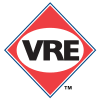 | |
| Overview | |
|---|---|
| Owner |
PRTC NVTC |
| Locale | Northern Virginia |
| Transit type | Regional rail |
| Number of lines | 2 |
| Number of stations | 19 |
| Daily ridership | 17,500 (Q1 2016)[1] |
| Annual ridership | 4,374,000 (2015)[2] |
| Website |
www |
| Operation | |
| Began operation | 1992 |
| Operator(s) | Keolis |
| Reporting marks | VREX |
| Technical | |
| System length | 90 mi (145 km) |
| Track gauge | 4 ft 8 1⁄2 in (1,435 mm) standard gauge |
The Virginia Railway Express (VRE) (reporting mark VREX) is a regional/commuter rail service that connects the Northern Virginia suburbs to Union Station in Washington, D.C., via two lines: the Fredericksburg Line from Fredericksburg, Virginia, and the Manassas Line from Broad Run/Airport station in Bristow, Virginia.
Service to Manassas began on June 22, 1992; the Fredericksburg service started on July 20, 1992.
VRE is owned by the Northern Virginia Transportation Commission and the Potomac and Rappahannock Transportation Commission. The NVTC and PRTC are governmental entities that were created by the Commonwealth of Virginia. Local governments (such as counties and cities) within each commission's geographic area are members of each commission.
History
Discussions about commuter rail service in Northern Virginia had occurred as early as 1964 at the Northern Virginia Transportation Commission, but died in the face of opposition by the freight railroads whose tracks offered ready access to core employment areas. The Metropolitan Washington Council of Governments eventually commissioned a regional feasibility study by R.L. Banks and Associates, Inc., and planning began in earnest for VRE in 1984.[3]
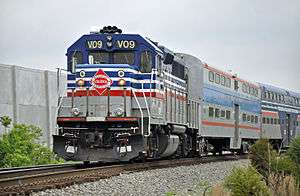
By 1986, it became apparent that the jurisdictions outside of NVTC could not reach agreement on how to support VRE by joining NVTC so the Potomac and Rappahannock Transportation Commission was created for Prince William and Stafford counties and the city of Manassas. Legislation established a 2% motor fuels tax to support VRE expenses and other transportation investments.
By 1988, NVTC and PRTC established a VRE Operations Board, consisting of three voting members plus alternates from each of the two commissions, plus a voting representative of the Commonwealth of Virginia (currently a representative of the Director of the Virginia Department of Rail and Public Transportation). The following year, the jurisdictions participating in the VRE project agreed to fund it according to a formula that weighted ridership by jurisdiction of residence with a factor of 90% and population with a factor of 10%. Arlington and Alexandria agreed to contribute to the project and have paid each year approximately what their formula share would be. The cities of Fredericksburg and Manassas Park joined PRTC in 1990 and signed the VRE Master Agreement and became participating jurisdictions in 1992.[3]
Spotsylvania County joined in February 2010 to allow construction of Spotsylvania station, which opened in November 2015.[4][5]
Operations
Rail service operates Monday through Friday only and is suspended or reduced on some holidays.
Through a cross-honoring agreement,[6] VRE and the MARC Train allow passengers to transfer to trains on the other system that are going in the opposite direction of the rush-hour commuters.
VRE operates on lines owned and maintained by Amtrak, Norfolk Southern and CSX Transportation. Most of the Fredericksburg Line is on CSX tracks, while the portion of the Manassas Line west of Alexandria is mostly on Norfolk Southern tracks. Union Station in Washington, DC, which is the northern terminus for most VRE trains, is owned and operated by Amtrak, including the station tracks.
VRE's trains were initially run by Amtrak. On November 5, 2009, VRE awarded a five-year, $85 million operating and maintenance contract to Keolis, a subsidiary of France's national railway.[7][8] The change in operations took place on July 12, 2010, two weeks later than planned, to allow Keolis employees to learn how to run VRE trains.[9]
Ridership on VRE increased an average of 13% each year from 2000 to 2005, but fell 2% in the fiscal year ending June 30, 2005. VRE said passengers affected by track maintenance and heat restrictions were taking other forms of transportation.[10] The trend reversed in the summer of 2007, with ridership up nearly 2% in June and 4% in July compared with the corresponding months in 2006.[11] As of July 2010, VRE transports an average of 17,600 passengers per day.[12]
In 2015, VRE extended its contract with Keolis for five years, with an additional option for another five-year extension in 2020.[13]
Lines and stations
VRE's fares are based on distance, with the 19 stations grouped into zones.
Fredericksburg Line
The Fredericksburg Line runs north–south along trackage owned by CSX, formerly the Richmond, Fredericksburg & Potomac Railroad. Amtrak service to Richmond, Virginia, and points south also uses this line. An extension to Spotsylvania opened in November 2015.[14]
| Station | Fare Zone | Miles | Connections |
|---|---|---|---|
| Union Station | 1 | 0 | Washington Metro, MARC, Amtrak |
| L'Enfant | 1 | 2 | Washington Metro |
| Crystal City | 2 | 5 | Washington Metro, Metroway |
| Alexandria Union Station | 2 | 9 | Washington Metro, Amtrak |
| Franconia-Springfield | 3 | 14 | Washington Metro |
| Lorton | 4 | 19 | |
| Woodbridge | 5 | 24 | Amtrak |
| Rippon | 5 | 28 | |
| Quantico | 6 | 35 | Amtrak |
| Brooke | 8 | 46 | |
| Leeland | 8 | 51 | |
| Fredericksburg | 9 | 55 | Amtrak |
| Spotsylvania | 9 | 60 |
Manassas Line
The Manassas Line runs east–west along trackage owned by Norfolk Southern. Three Amtrak trains, the Crescent to Atlanta and New Orleans, the Cardinal to Chicago, and the Northeast Regional to Lynchburg, also use this line. VRE is studying an extension of the Manassas Line west to the communities of Gainesville and Haymarket.
| Station | Fare Zone | Miles | Connections |
|---|---|---|---|
| Union Station | 1 | 0 | Washington Metro, MARC, Amtrak |
| L'Enfant | 1 | 2 | Washington Metro |
| Crystal City | 2 | 5 | Washington Metro, Metroway |
| Alexandria Union Station | 2 | 9 | Washington Metro, Amtrak |
| Backlick Road | 3 | 13 | |
| Rolling Road | 4 | 19 | |
| Burke Centre | 4 | 21 | Amtrak |
| Manassas Park | 6 | 29 | |
| Manassas | 6 | 32 | Amtrak |
| Broad Run | 6 | 35 |
Proposed lines/stations
Haymarket Line
VRE is investigating the possibility of building a third line out to Haymarket. The feasibility study is planned to be complete in 2017, with the hope of opening the line in mid-2022.[15]
Equipment
The Virginia Railway Express commenced operations in 1992 with ten EMD RP39-2C diesel locomotives, 38 Mafersa coaches, and 21 remanufactured Budd Rail Diesel Car (RDCs) from the MBTA. Morrison-Knudsen rebuilt the locomotives from EMD GP40s at a total cost of $5.9 million. Mafersa built the coaches new at $24.7 million, or $600,000–$700,000 per car.[16] VRE sold 33 of the Mafersa coaches to the Connecticut Department of Transportation in 2004 for its Shore Line East service.[17] QIT-Fer et Titane, a Quebec mining company, purchased the remaining five cars in 2008.[3]
Locomotive fleet
| Model | Numbers | Notes | Image |
|---|---|---|---|
| EMD RP39-2C | V1-V10 (retired)[18] | Rebuilt from original units by Morrison-Knudsen.[18] Lack the flared radiators of VRE's GP40s. |  |
| EMD RP40-2C | V20-V21 (retired)[18] | Rebuilt by Morrison-Knudsen[18] | 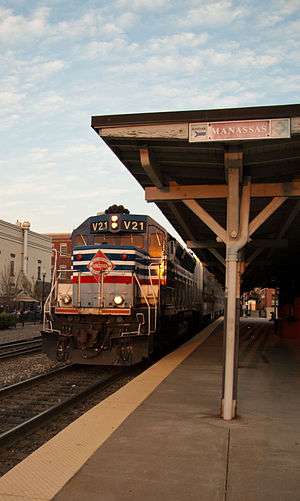 |
| EMD GP40H-2 | V22-V24 (retired)[18] | V22 and V23 rebuilt by Atelier Montreal Facilities, V24 acquired from North Carolina Department of Transportation.[18] |
 |
| EMD F40PH-2 | V34-V36 (retired)[18] | All former Amtrak units (and ex-GO Transit units). VRE formerly operated one more, number V31, until lease expired.[18] VRE F40PH-2 #V-30 returned to Amtrak and stored at Beech Grove as AMTK 403. Units V32 and V33 have also been sold and removed from the roster.[19] |  |
| MPI MP36PH-3C | V50-V69 | Total order of 20.[20][21] The first unit was delivered on August 5, 2010, and all units are currently in service. These locomotives are the first new locomotives that VRE has ever purchased.[22] |  |
VRE operated a pair of EMD F59PHI locomotives and 18 high capacity bi-level cars on lease from Sound Transit in 2003 until 2006; they have since been returned and replaced by the MPI locomotives and the Sumitomo bi-level cars.[18][23]
Coach fleet
| Model | Builder | Years Built | Seats | Numbers | |
|---|---|---|---|---|---|
| Gallery I Trailer Car | Pullman Company | 1956 | 157 | 405, 408, 412–413, 415 | |
| Gallery II Trailer Car | Pullman Company | 1956 | 157 | 421–429 | |
| Gallery III Trailer Car | Pullman Company | 1960–68 | 157 | 431, 433, 437, 440 & 449 | |
| Gallery IV Cab Car | Sumitomo/Nippon Sharyo | 2006–08 | 123 | 710–730* | |
| Gallery IV Trailer Car | Sumitomo/Nippon Sharyo | 2007–09 | 132*, 144 | 800–819*, 850–869, 870–879 | |
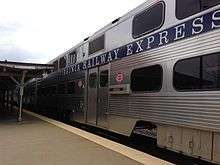 VRE Manassas Line Train |
Gallery IV Trailer Car | Sumitomo/Nippon Sharyo | 2014 | 132 | 820-827*; eight cars ordered in February 2012 with options for 42 more[24] |
(* with restroom)
VRE used to operate Kawasaki units, however in 2008, all 13 were sold to neighboring service MARC Train.
Safety/Accidents
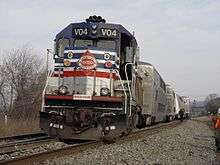
On January 5, 2006, at 6:45 am, Fredericksburg line train No. 304 bound for Washington, D.C. derailed at Possum Point, just north of the Quantico section of Prince William County. Four people, including the assistant conductor, suffered minor injuries and were treated and released by medical personnel. The National Transportation Safety Board determined that the derailment was likely caused by an excessively worn and chipped switch point, which caused the lead truck of the fourth passenger car to derail. CSX failed to replace the switch point even after it had been repeatedly identified as deteriorating.[25]
On October 3, 2012, Virginia Governor Bob McDonnell launched a review of "multiple internal control issues", including reports of corruption and favoritism, that "call into question the management of the Virginia Railway Express". For example, VRE managers disregarded warnings by a former employee, later borne out, that a train would hit the new Broad Run platform.[26]
On January 15, 2014, a pedestrian, Danyelle Lynn Anderson, was struck and killed by a commuter train as she walked on the Manassas line near Burke in Fairfax County.[27][28]
On February 26, 2014, a pedestrian, 15-year-old Jack Chen, was struck and killed by a commuter train as he walked on the Manassas line near Burke Center in Fairfax County.[29]
See also
References
- ↑ "Transit Ridership Report First Quarter 2016" (pdf). American Public Transportation Association. May 19, 2016. Retrieved 2016-07-09 – via http://www.apta.com/resources/statistics/Pages/ridershipreport.aspx.
- ↑ "Transit Ridership Report Fourth Quarter 2015" (pdf). American Public Transportation Association. March 2, 2016. Retrieved 2016-07-09 – via http://www.apta.com/resources/statistics/Pages/ridershipreport.aspx.
- 1 2 3 Taube, Richard K. (11 August 2008). "Chronology of the Virginia Railway Express: 1964 to Present" (PDF). Virginia Railway Express. Retrieved 16 November 2015.
- ↑ HDR Engineering (4 August 2010). "Spotsylvania County VRE Commuter Rail Station Site Screening Analysis: Final Technical Memorandum" (PDF). Spotsylvania County. Archived from the original (PDF) on August 5, 2014. Retrieved 17 January 2013.
- ↑ Lazo, Luz (26 October 2015). "VRE's Spotsylvania station to open next month". Washington Post. Retrieved 27 October 2015.
- ↑ VRE-MARC cross-honoring agreement
- ↑ "Keolis in, Amtrak out at VRE". Trains Magazine. November 6, 2009. Retrieved June 10, 2010.
- ↑ Buske, Jennifer (2010-07-10). "Amtrak ends role as VRE operator; Keolis to start Monday". The Washington Post. ISSN 0190-8286. Retrieved 2015-09-27.
- ↑ "Amtrak gets two more weeks to operate Virginia Railway Express". Trains Magazine. June 10, 2010. Retrieved June 10, 2010.
- ↑ "Virginia Railway Express Sees Decline in Ridership", WTOP news, July 25, 2006
- ↑ Dan Genz, "VRE ridership up; commuters likely to ask for later trains", Washington Examiner, August 15, 2007
- ↑ "VRE CEO Report – July 2010" (PDF).
- ↑ Worrell, Carolina (14 July 2015). "VRE extends contract with Keolis". Railway Age. Retrieved 27 September 2015.
- ↑ Lazo, Luz (15 November 2015). "VRE Spotsylvania station to open Monday". Washington Post. Retrieved 16 November 2015.
- ↑ "Gainesville-Haymarket Extension Study". VRE.org.
- ↑ Middleton, William D. (1994). North American commuter rail 1994. Pasadena, CA: Pentrex. p. 16. OCLC 32665882.
- ↑ "Connecticut State Rail Plan 2012-2016" (PDF). Connecticut Department of Transportation. 2012. pp. 37; 238. Retrieved March 26, 2016.
- 1 2 3 4 5 6 7 8 9 "Virginia Railway Express". The Diesel Shop. Retrieved July 8, 2010.
- ↑ "VRE Equipment". Virginia Railway Express.
- ↑ "VRE taps MotivePower for 12 locomotives, option for 8". August 18, 2009. Retrieved July 8, 2010.
- ↑ "VRE has $5.1 million surplus". Washington Post. September 20, 2010. Retrieved September 20, 2010.
- ↑ Buske, Jennifer (August 5, 2010). "Virginia Railway Express begins adding new locomotives to its fleet". The Washington Post. Retrieved August 5, 2010.
- ↑ http://www.vre.org/about/strategic/StratPlan_Sect1.pdf
- ↑ "Virginia Railway Express orders gallery cars". Railway Gazette International. February 17, 2012. Archived from the original on February 17, 2012. Retrieved February 18, 2012.
- ↑ "Railroad Accident Brief – Derailment of Virginia Railway Express train near Quantico, Virginia, January 5, 2006", National Transportation Safety Board report NTSB/RAB-06/06 (includes link to pdf document with full report), retrieved March 22, 2008
- ↑ Gov. McDonnell Initiates Review of VRE
- ↑ "Accidental Death on VRE Tracks", Fairfax County Police Department, January 15, 2014
- ↑ Evening commute changes on VRE after person struck by train. Washington Post. January 15, 2014. Retrieved January 15, 2014.
- ↑ "Fairfax teen dies after being struck by VRE train", Washington Post, February 26, 2014
External links
| Wikimedia Commons has media related to Virginia Railway Express. |